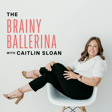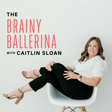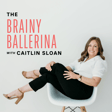
10. Embracing the Joy in Ballet with Camille Goldsborough
Camille Goldsborough is a professional ballerina based in Los Angeles, currently dancing as a soloist with Petra Conti’s Hollywood ballet. Since moving to LA, Camille has worked as a model as well as dancing in films, commercials and music videos. She is the founder of The Prima Club, a positive brand and community for dancers, and of Dance Dominican, a foundation that supports teaching ballet throughout orphanages in the Dominican Republic.
Camille is incredibly generous with her experiences, sharing insight about touring through Europe, dealing with her first major injury and tips for breaking into the freelance dance industry. Her positive attitude is infectious - if you’re looking for inspiration to go out there and MAKE IT HAPPEN, this is the episode for you!
Key Moments:
- Early dance training [1:30]
- Moving away from home at 15 to study ballet [3:06]
- Her first steps into the world of professional dance [8:32]
- Spending a year touring throughout Europe [14:55]
- Dealing with her first major injury [20:20]
- Her tips for breaking into the freelance dance industry [29:30]
- Founding The Prima Club [39:02]
- Her biggest piece of advice for dancers pursuing a career [42:45]
Connect with Camille:
CAMILLE’S WEBSITE: camillegoldsborough.com
THE PRIMA CLUB: theprimaclub.com
INSTAGRAM: instagram.com/camillegoldsborough
INSTAGRAM: instagram.com/theprimaclub
Links and Resources:
The Intentional Career Handbook: https://www.thebrainyballerina.com/intentional-career-handbook
1-1 Career Mentoring: book your complimentary career call
Let’s connect!
My WEBSITE: thebrainyballerina.com
INSTAGRAM: instagram.com/thebrainyballerina
Questions/comments? Email me at caitlin@thebrainyballerina.com


